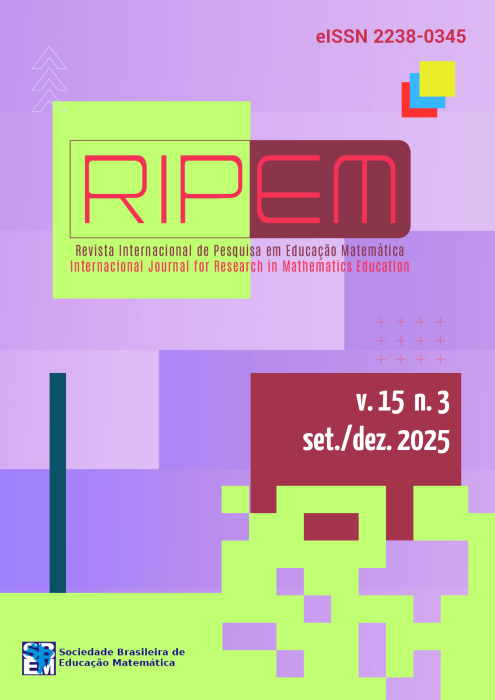Construcción Relacional del Objeto Algebraico (CROA): Una Estrategia Cognitivo-Lingüística para Desarrollar el Pensamiento Algebraico.
Palabras clave:
Álgebra Universitaria, Formación Inicial Docente, Lenguaje Algebraicamente Significativo, Metáforas Algebraicamente Significativas, Pensamiento AlgebraicoResumen
Este estudio tuvo como objetivo identificar los aspectos del Pensamiento Algebraico (PA) que inciden en la formación inicial de los estudiantes para profesor de matemática (EPPM) durante su aprendizaje del álgebra universitaria. Fueron asumidas las nociones de: Registros de Representación Semiótica; Teoría de la Objetivación; Epistemografía; aspectos socioculturales del aprendizaje y Cognición Matemática. El contexto de la investigación fue un curso de Álgebra desarrollado en una universidad pedagógica, utilizando Observación Participante y Diarios de Clase. Como resultado se propone el constructo Construcción Relacional del Objeto Algebraico (CROA), referido al aprendizaje de conceptos algebraicos conjugando el lenguaje algebraicamente significativo (LAS) y las metáforas algebraicamente significativas (METAS).
Descargas
Referencias
Arana, A. & González, F. (2006). Enriquecimiento conceptual progresivo: Una explicación teórica del proceso de desarrollo de los conceptos científicos. Revista de Pedagogía, 27(79), 193-230. https://ve.scielo.org/scielo.php?script=sci_arttext&pid=S0798-97922006000200002&lng=es&tlng=es
Cassany, D. (2012). En línea. Leer y escribir en la red. Anagrama.
Chumaceiro, I. & Pérez, M. L. (2011). La literatura como puente para la lectura. In A. Bolívar & R. Beke (Comp.), Lectura y escritura para la investigación (pp. [page range]). Consejo de Desarrollo Científico y Humanístico de la Universidad Central de Venezuela.
Corbetta, P. (2003). Metodología y técnicas de investigación social. McGraw-Hill.
Drouhard, J. P. (2009). Epistemography and algebra. In Proceedings of the Sixth Congress of the European Society for Research in Mathematics Education (pp. 479-488). https://www.academia.edu/66520299/Proceedings_of_the_Sixth_Congress_of_the_European_Society_for_Research_in_Mathematics_Education
Duval, R. (2002). Representation, vision and visualization: Cognitive functions in mathematical thinking. Basic issues for learning. In F. Hitt & M. Santos (Eds.), Proceedings of the Twenty-first Annual Meeting of the North American Chapter of the International Group for the Psychology of Mathematics Education. 1, pp. 3-26.
Duval, R. (2006). Un tema crucial en la educación matemática: La habilidad para cambiar el registro de representación. La Gaceta de La RSME, 9(1), 143–168.
Duval, R., & Moretti, M. (2012). Registros de representação semiótica e funcionamento cognitivo do pensamento. REVEMAT: Revista Eletrônica de Educação Matemática, 7(2), 266-287. https://periodicos.ufsc.br/index.php/revemat/article/view/1981-1322.2012v7n2p266
Eves, H. (2011). Introdução à História da Matemática (H. H. Domínguez, Trans.). UNICAMP Editora.
Freire, P. (1970). Pedagogía del oprimido. Siglo XXI Editores.
Freudenthal, H. (1983). Didactical phenomenology of mathematical structures. Reidel.
González, A. (2015). Procesos del pensamiento algebraico en entornos de aprendizaje mediados tecnológicamente [Doctoral dissertation, Universidad Central de Venezuela].
González, F. (2005). Algunas cuestiones básicas acerca de la enseñanza de conceptos matemáticos. Fundamentos en Humanidades, 6(1), 37-80. https://www.researchgate.net/publication/28111875_Algunas_cuestiones_basicas_acerca_de_la_ensenanza_de_conceptos_matematicos
González, F. (2010). Un modelo didáctico para la formación inicial de profesores de matemática. Sapiens, 11(1), 47-59. https://biblat.unam.mx/hevila/Sapiens/2010/vol11/no1/3.pdf
González, F. E. (1998). Procesos cognitivos y metacognitivos que activan los estudiantes universitarios venezolanos cuando resuelven problemas matemáticos. Educación Matemática, 10(3), 172–181. https://doi.org/10.24844/em1003.12
González, F. E. (2020). Reflexões sobre alguns conceitos da pesquisa qualitativa. Revista Pesquisa Qualitativa, 8(17), 155–183. https://doi.org/10.33361/RPQ.2020.v.8.n.17.322
González R., A. A. & González, F. E. (2024). Lenguaje Algebraicamente Significativo en el Aprendizaje del Álgebra Universitaria. Bolema: Boletim de Educação Matemática, 38, e220187. https://doi.org/10.1590/1980-4415v38a220187
Lakoff, G., & Johnson, M. (1980). Metáforas de la vida cotidiana. Teorema.
Lakoff, G., & Núñez, R. (2000). Where mathematics comes from: How the embodied mind brings mathematics into being. Basic Books.
Maturana, H. (2006). Ontología del conversar. In J. Luzaro García (Comp.), Desde la biología a la psicología (pp. 84-95). Editorial Universitaria.
Maturana, H. & Dávila, X. (2018). El lenguaje y el lenguajear. Matríztica. https://medium.com/@Matriztica_76766/el-len-guaje-y-el-lenguajear-d40ca92b70e5
Nesselmann, G. H. F. (1842). Versuch einer kritischen Geschichte der Algebra, Theil 1. Die Algebra der Griechen [Essay of a critical history of algebra, Part 1. The algebra of the Greeks]. De Gruyter Mouton. https://doi.org/10.1515/9783111585789
Papini, M. C. (2003). Algunas explicaciones Vigotskianas para los primeros aprendizajes del álgebra. Revista Latinoamericana de Investigación en Matemática Educativa, 6(1), 41–71. https://relime.org/index.php/relime/article/view/554
Pimm, D. (2002). El lenguaje matemático en el aula. Morata.
Radford, L. (1995a). Before the other unknowns were invented: Didactic inquiries on the methods and problems of mediaeval Italian algebra. For the Learning of Mathematics, 15(3), 28–38. http://www.jstor.org/stable/40248185
Radford, L. (1995b). Linking psychology and epistemology: Can the history of mathematics be a useful tool for teaching mathematics? Proceedings of the Canadian Society for the History and Philosophy of Mathematics, 8, 328-342. https://www.researchgate.net/publication/283461103_Linking_Psychology_and_Epistemology_Can_the_History_of_Mathematics_Be_a_Useful_Tool_for_Teaching_Mathematics
Radford, L. (2008). Connecting theories in mathematics education: Challenges and possibilities. ZDM - The International Journal on Mathematics Education, 40(2), 317-327. https://doi.org/10.1007/s11858-008-0090-3
Radford, L. (2010a). Algebraic thinking from a cultural semiotic perspective. Research in Mathematics Education, 12(1), 1-19. https://www.luisradford.ca/pub/22_RME2010Algebraicthinkingfromaculturalsemioticperspective.pdf
Radford, L. (2010b). Layers of generality and types of generalization in pattern activities. PNA, 4(2), 37-62. https://www.luisradford.ca/pub/23_PNA2010Layersgenerality.pdf
Rojano, T. (1994). La matemática escolar como lenguaje. Nuevas perspectivas de investigación y enseñanza. Enseñanza de las Ciencias, 12(1), 45-56. https://doi.org/10.5565/rev/ensciencias.4483
Stacey, K., Chick, H. & Kendal, M. (Eds.). (2001). The future of the teaching and learning of algebra: The 12th ICMI study conference. Kluwer Academic Publishers. https://archive.org/details/proceedingsof12t0002unse
Taylor, S. J. & Bogdan, R. (1984). Introducción a los métodos cualitativos de investigación: La búsqueda de significados. Paidós.
Ursini, S. (1996). Una perspectiva social para la educación matemática. La influencia de la teoría de L. S. Vygotsky. Educación Matemática, 8(3), 42-49. https://www.revista-educacion-matematica.org.mx/descargas/Vol8/3/05Ursini.pdf
Vygotsky, L. S. (1979). El desarrollo de los procesos psicológicos superiores. Crítica.
Yin, R. K. (2018). Case study research and applications: Design and methods (6 ed.). SAGE.
Descargas
Publicado
Número
Sección
Licencia

Esta obra está bajo una licencia internacional Creative Commons Atribución-NoComercial-CompartirIgual 4.0.



